Main Article Content
Abstract
This study primarily aims to examine the extent to which strategic intelligence is utilized in human resource planning to address crises and emergencies in the Sultanate of Oman. It also explores the impact of strategic intelligence on crisis prevention and preparedness in Oman. To achieve the study’s objectives and answer its research questions, a thorough review of related literature and prior studies was conducted, forming the basis for developing the research framework and survey instrument. The study employed the descriptive-analytical method, utilizing a survey approach. Fieldwork was conducted to identify the research population, which included all directors, department heads, officials, specialists, and employees involved in strategic planning and crisis management within public sector institutions in Oman during the 2024-2025 period, totaling 6,045 individuals. A representative sample of 362 participants was selected using Thompson's formula. After validating the survey as a research tool and ensuring its psychometric properties, it was administered to the study population. Statistical analysis of the collected data revealed that strategic intelligence is highly prevalent within the administrative system for crisis and emergency management in Oman. The findings also highlighted the significant role of strategic intelligence in crisis prevention and preparedness. However, the study identified a need for training on employing strategic intelligence in crisis and emergency management. Based on these findings, the study recommends prioritizing the training of human resources on utilizing strategic intelligence and integrating it into specific strategic plans for emergencies. This would enhance the administrative system's capacity for effective and prompt responses to crises and improve preparedness.
Keywords
Article Details
Copyright (c) 2025 Al-Muqaddimah: Online Journal of Islamic History and Civilization

This work is licensed under a Creative Commons Attribution-NonCommercial-ShareAlike 4.0 International License.
By submitting manuscripts to the Al-Muqaddimah, authors agree to transfer copyright to the journal. However, authors may republish their work or grant others permission to republish it; in which case it should be accompanied by a proper acknowledgment that the work was originally published in the Al-Muqaddimah. The journal adopt CC-BY-NC-SA licence which authors may also share and distribute their article anywhere of non-commercial website, social media and repositories immediately on publication.
Authors may also reuse the Abstract and Citation information (e.g. Title, Author name, Publication dates) of their article anywhere at any time including social media such as Facebook, blogs and X (Twitter), providing that where possible a link is included back to the article on the journal site.

